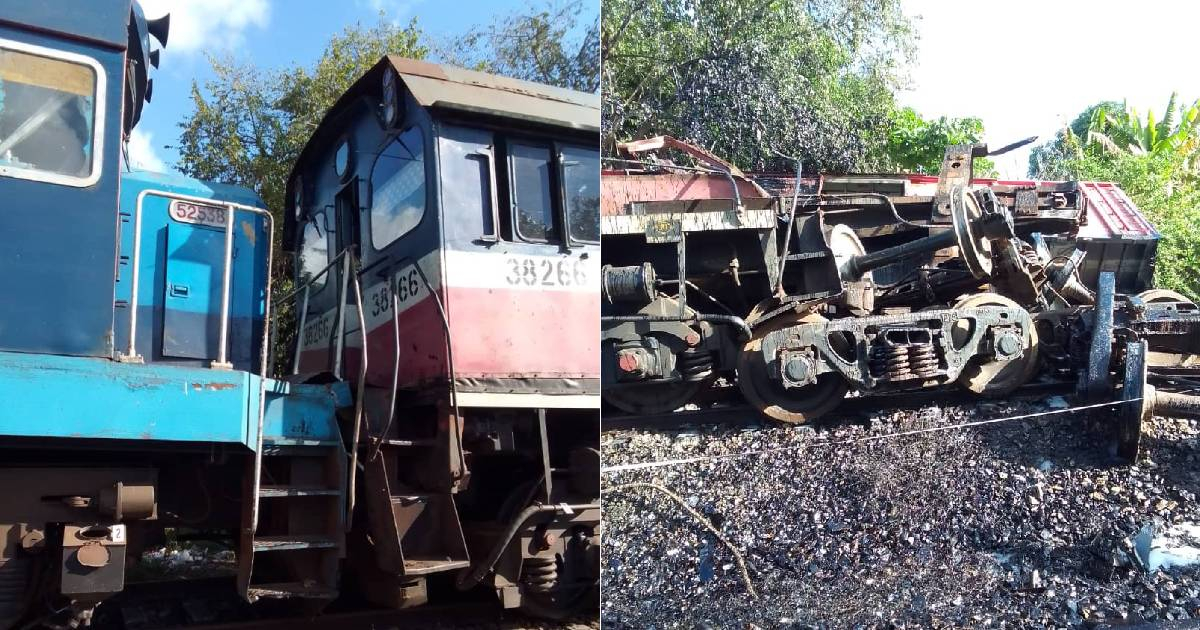
Following the train accident involving two freight trains at kilometer 349.0 of the Central Railway Line, between the Guayos and Siguaney stations in the province of Sancti Spíritus, the Cuban Minister of Transportation, Eduardo Rodríguez Dávila, reported that efforts are underway to recover any possible fuel.
Through his Facebook profile, the official stated that one of the train cars transporting crude oil overturned, resulting in a spill at the accident site.
The affected car transported a total of 60 tons of oil, and the final amount that can be recovered will be determined upon the completion of the process conducted in coordination with the state company Cupet.
He also assured that environmental actions will be taken at the site to mitigate the impact of the spill.
In his statement, Rodríguez Dávila noted that initial investigations suggest the accident was due to a violation of railway operations regulations. "An investigative committee has been established to clarify the causes of the incident and determine responsibilities," he added.
The Minister emphasized the seriousness of events like this, which not only jeopardize human safety but also further complicate the national economy and cause significant environmental damage.
Similarly, he committed to urgently analyze the lessons from the incident and to implement measures to prevent similar situations from occurring in the future.
The accident occurred on the morning of this Saturday at around 7:30 am, involving two freight trains: Extra Train 67, with locomotive 52538 and a consist of 26 loaded cars, and Extra Train No. 912, with locomotive 38266 and 11 cars.
Following the impact, authorities stated that there is significant material damage to one of the locomotives, number 38266, but no injuries were reported among the workers, nor were there major impacts on the road infrastructure.
Reports from the scene of the incident indicate that one of the trains was coming from the Mariel Special Development Zone (ZEDM) and was headed to the city of Camagüey.
The other convoy had departed from Ciego de Ávila and was transporting six cars filled with crude oil destined for the Sergio Soto refinery, located in Sancti Spíritus.
In April of this year, the province of Sancti Spíritus was the site of another significant railway incident. On April 13, around 2:30 PM, Extra Train 900, which was transporting crude oil to the Sergio Soto refinery in Cabaiguán, derailed at kilometer 364.2 on the Central Line, near Siguaney.
Initially, authorities reported that there was no product spill or human casualties, although damage was reported to the railway and the fuel tanks.
However, days later, on April 17, the Ministry of Science, Technology, and the Environment (CITMA) of Sancti Spíritus confirmed a spill of between 200 and 250 liters of oil, which reached a stream just five kilometers from the Zaza River.
In that situation, containment measures were implemented, such as the construction of earthen barriers and the manual collection of fuel, to prevent further contamination.
This incident temporarily disrupted rail traffic on the Central Line, diverting passenger trains to alternative routes and extending travel times.
Frequently Asked Questions about the railway accident in Sancti Spíritus and the transportation situation in Cuba.
What caused the freight train accident in Sancti Spíritus?
The accident was the result of a violation of railway operations regulations, according to initial investigations. Two freight trains collided on the Central Railway Line, causing significant damage and a spill of crude oil from one of the cars.
How does this accident affect the Cuban economy?
The accident not only poses a risk to human safety but also further complicates the national economy by causing significant fuel losses and material damage to locomotives. These incidents highlight the deterioration of the railway infrastructure in Cuba.
What measures are being taken to mitigate the impact of the oil spill?
Environmental actions are being taken to mitigate the impact of the oil spill. The recovery of the fuel is being carried out in coordination with the state company Cupet, and measures are being implemented to contain the leak and prevent further environmental disaster.
What is the current situation of rail transport in Cuba?
In 2024, train accidents in Cuba have become a recurring problem due to the notable deterioration of the railway infrastructure and the lack of safety at crossings. This has prompted criticism from the public and a demand for improvements in safety and maintenance.
What consequences could railway accidents have on the future of transportation in Cuba?
The ongoing railway accidents could exacerbate the public transportation crisis in Cuba, impacting passenger mobility and the transport of goods. Without improvements in infrastructure and safety, these incidents will continue to disrupt essential services and heighten criticism of the government.
Filed under: